Research - (2021) Volume 9, Issue 2
Awareness on Natural Agents for Skin Care Among Teenagers: A Questionnaire Based Survey
Joseph George Kallivayalil, Vishnu Priya V* and Gayathri R
*Correspondence: Vishnu Priya V, Department of Biochemistry, Saveetha Dental College and Hospitals, Saveetha Institute of Medical and Technical Sciences (SIMATS), Saveetha University Tamilnadu, Chennai, India, Email:
Abstract
Natural substances were used in topical creams, lotions and preparations within the conventional drugs. Over the 20 years, scientific and laboratory studies have identified an array of natural elements for pores and skin care. Consequently, some of these components are nowadays being developed, used or taken into consideration not only for anti-ageing effects, however also for use in dermatologic disorders. Certain components, along with colloidal oatmeal and aloe vera, had been identified as useful for the treatment of psoriasis and atopic dermatitis, respectively. This is due to their anti-inflammatory properties. For combating acne and rosacea, natural compounds present in tea and vitamins E and niacinamide are taken into consideration. Licorice, green tea, arbutin, soy, acai berry, turmeric and pomegranate are amongst the natural compounds having antioxidative, anti-carcinogenic activities. The aim of this study is to create awareness on natural skin care products among teenagers. This questionnaire-based survey consists of questions based on awareness on natural compounds used for skin care among teenagers. The questions were administered to the participants through an online survey planet link. The data was collected, and results were statistically analyzed. 50.9% respondents were aware that vitamin B 12 prevents dark pigmentation on skin and 49.1% were not aware. More research may be needed to affirm and elucidate the active substances present in natural products essential for skin care without any side effects.
Keywords
Natural compounds, Topical creams, Anti-ageing, Anti-inflammatory, Online survey
Introduction
Natural skin care makes use of topical lotions and lotions made of compounds available in nature. Most of the natural skin care products are now from plant derived substances, which may include herbs, roots, flora, and important oils but herbal materials in skin care products have animal derived products along with beeswax and minerals these substances can be mixed with numerous agents, preservatives, surfactants, humectants and emulsifiers [1]. Natural skin care components are made from nature itself they are used to be sold primarily in health food stores and farmers markets with labels decorated with pictures of leaves [2].
González-Minero et al. in his article of “The use of plants in skin care products, cosmetics , and fragrances in a natural manner” depicts us that natural remedy on skin care have been a great demand in the recent years and also various use of natural products and methods from ageing of skin prevent the appearance of illness [3]. Kumar et al. in his article of “Measuring health conscious level and beauty and facial level regarding skin care between college men and women” show us that female skin remains glowing and healthy upto age 40. These have also been taken into consideration in my study. Cosmeceuticals are topically-applied, combination products that bring together cosmetics and biologically active ingredients. Products which are similar in perceived benefits but ingested orally are known as nutricosmetics [4].
Consumers often express a preference for skin products with organic and natural ingredients. The skin care market based on natural products has shown strong growth. Clinical and laboratory studies have identified activities in many natural ingredients that have potential beneficial activities for the skin [5]. There are significant reservations about complementary and alternative medicine (CAM) including a shortage of evidence supporting the efficacy and safety of CAM for skin problems [6]. Ayurvedic skin care is based on Indian philosophical, psychological, conventional, and medicinal understandings. Phyllanthus emblica (amla, Indian gooseberry) has been used in ayurvedic medicine. Standardized extracts of Phyllanthus emblica have a long-lasting and broad-spectrum antioxidant activity. This may be suitable for use in Anti-aging cream, sunscreen and generalpurpose skin care products [7]. Previous study depicts how various plant extracts show different methods from ageing of skin and prevent the appearance of illness or ageing [8]. A study shows the comparison of collagen deposition and density among male and female individuals in college. It gives us a clear idea stating that female skin remains glowing and healthy up to age 40. The males have a higher collagen composition. Healthy eating and lifestyle also play a major role in maintaining skin care [9]. The major points is that eating a healthy diet can give nourishment to skin and the harmful effects of moisturizer which damages cells at a deeper cellular level are also depicted in a study [10]. Previous studies on cancer biology, nano materials Previous studies on cancer biology, nanoparticles [11-16] have motivated me to pursue this current research which is useful to your community. The aim of this study is to create awareness on natural skin care products among teenagers.
Materials and Methods
A self-structured questionnaire was prepared based on the awareness of natural products for skin care and administered among 100 teenagers through an online survey planet link. The questionnaire consists of 10 questions. The participants were explained about the study in detail. The study was approved by the Institutional Review Board, Saveetha Dental College. The data was collected and statistically analyzed. The output variables were represented by pie charts.
Results and Discussion
The survey was administered to 100 students and results were tabulated. 50.9% respondents were aware that vitamin B 12 prevents dark pigmentation on skin and 49.1% were not aware (Figure 1). 70% of the teenagers preferred to use natural products in their skin to maintain originality of skin while 30% do not prefer to use natural products on their skin (Figure 2). 75.2% of the respondents were aware that oatmeal is good for skin and 24.8% were not aware (Figure 3). 40% of the respondents were aware that oatmeal can relieve skin irritation, 34.5% were aware it can remove dirt from skin and 25.5% were aware it can stop rashes (Figure 4). 84% used rose water for having beneficial effects on skin while the rest of the 15% does not understand the benefits of rose water (Figure 5). 74.1% respondents were aware that vitamin E is good for skin (Figure 6). 60.5% of the respondents preferred to hydrate the skin to prevent dryness of skin, 32.8% preferred moisturizing of skin and 6.7% preferred the usage of hot water (Figure 7). 71.7% respondents were aware that turmeric can reduce acne on skin and 28.3% were not aware (Figure 8). 75.4% respondents were aware that the mixture of besan flour and milk gave more texture on skin and 24.6% were not aware (Figure 9). 87.8% respondents were aware that hydration made the skin healthy and 12.2% were not aware (Figure 10) [16].
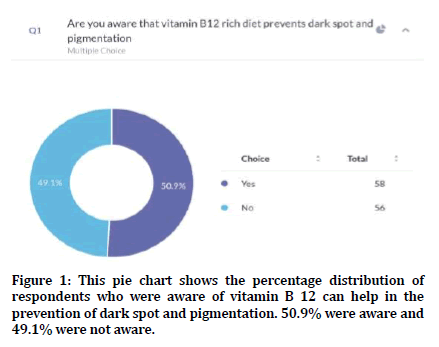
Figure 1. This pie chart shows the percentage distribution of respondents who were aware of vitamin B 12 can help in the prevention of dark spot and pigmentation. 50.9% were aware and 49.1% were not aware.
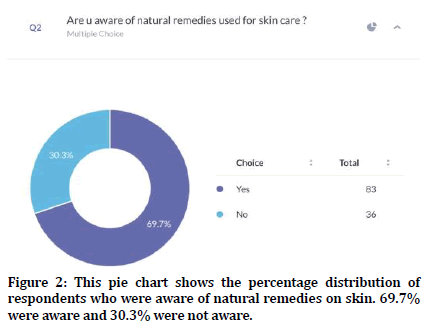
Figure 2. This pie chart shows the percentage distribution of respondents who were aware of natural remedies on skin. 69.7% were aware and 30.3% were not aware.
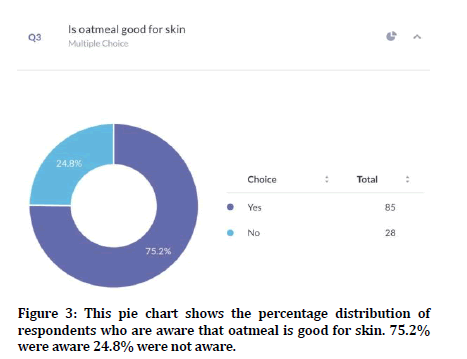
Figure 3. This pie chart shows the percentage distribution of respondents who are aware that oatmeal is good for skin. 75.2% were aware 24.8% were not aware.
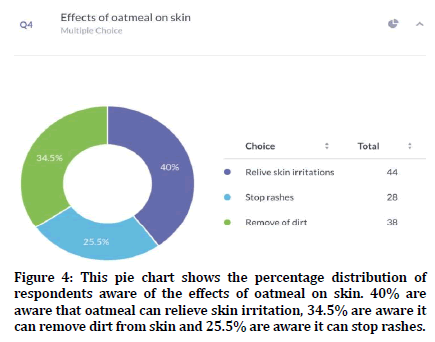
Figure 4. This pie chart shows the percentage distribution of respondents aware of the effects of oatmeal on skin. 40% are aware that oatmeal can relieve skin irritation, 34.5% are aware it can remove dirt from skin and 25.5% are aware it can stop rashes.
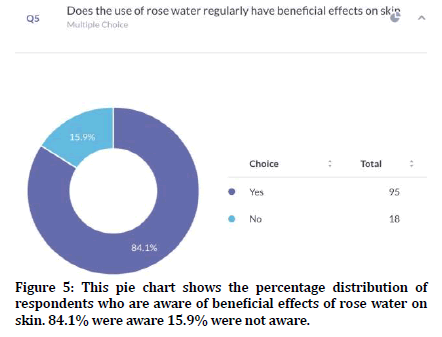
Figure 5. This pie chart shows the percentage distribution of respondents who are aware of beneficial effects of rose water on skin. 84.1% were aware 15.9% were not aware.
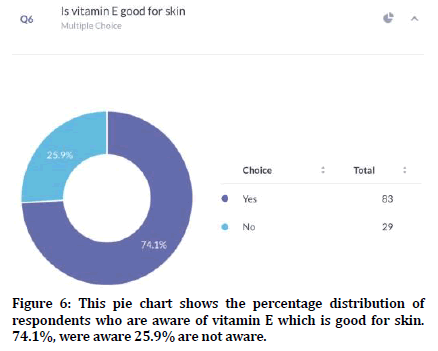
Figure 6. This pie chart shows the percentage distribution of respondents who are aware of vitamin E which is good for skin. 74.1%, were aware 25.9% are not aware.
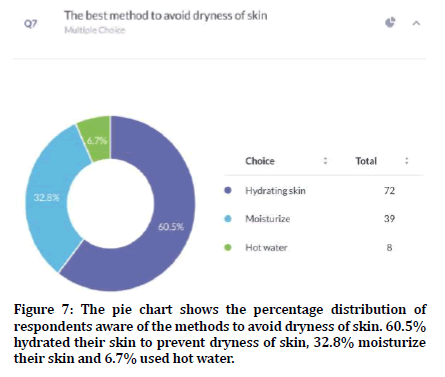
Figure 7. The pie chart shows the percentage distribution of respondents aware of the methods to avoid dryness of skin. 60.5% hydrated their skin to prevent dryness of skin, 32.8% moisturize their skin and 6.7% used hot water.
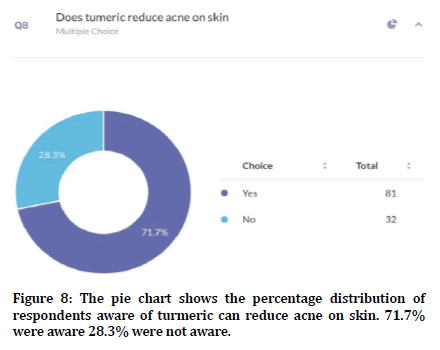
Figure 8. The pie chart shows the percentage distribution of respondents aware of turmeric can reduce acne on skin. 71.7% were aware 28.3% were not aware.
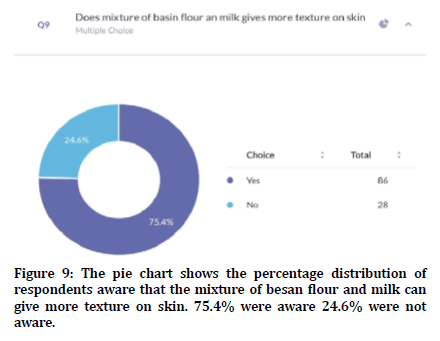
Figure 9. The pie chart shows the percentage distribution of respondents aware that the mixture of besan flour and milk can give more texture on skin. 75.4% were aware 24.6% were not aware.
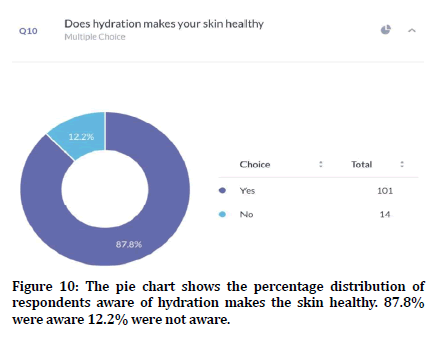
Figure 10. The pie chart shows the percentage distribution of respondents aware of hydration makes the skin healthy. 87.8% were aware 12.2% were not aware.
In a study it shows us that 40% believe that oatmeal on skin relieves skin irritations and 30% conclude that oatmeal stops skin rashes on their body in a vast manner .75% of the teenagers believe oatmeal removes dirt from skin. As Usher et al. discussed in her article of skin care, in her study she embarked on the point that harmless natural skin care methodologies in order increase transient moisture retention, help in cleansing action of skin and also helps in checking the possibility of topical treatment [17]. Maayer et al. in her article discussed the topic of ultimate goal for using topical treatments to reduce or prevent the appearance of fine lines and wrinkles and unsurprisingly all the present generation are in the usage of retinoids and high chemical composed cosmetics which can lead to skin cancer and adverse skin diseases [18]. Gettysburg college had published an article showing the percentage of those who prefer natural skin care products. They have depicted that the highest and the heaviest buyers of skin care products are mainly females [19].
Conclusion
Nowadays, cosmetic industries are smart enough to adopt oriental and natural skin care techniques and also follow traditional medicines. They help in blending modern scientific knowledge to find out more skin care products with growing knowledge in skin biology, the science behind all this have been reported by multicore industries. We all should step forward in our effort to discriminate against knowledge and help in adverse and advanced areas of research in cosmetic science. The aging process is a challenging human experience common to everyone, and the desire to look young prevails to most of us. The latest trends in the beauty, health and wellness sectors are giving rise to a new age of possibilities by fusing anti-aging cosmetics with traditional Ayurveda. Natural products help in the exploration of possibilities of developing new anti-aging cosmetics with natural ingredients for topical applications. More research may be needed to affirm and elucidate the active substances present in natural products essential for skin care without any side effects.
Acknowledgement
The author expresses their sincere thanks to Saveetha Dental College for extending full support to complete this study.
References
- Bowe WP, Pugliese S. Cosmetic benefits of natural ingredients. J Drugs Dermatol 2014; 13:1021–1025.
- Cho C. The little book of skin care: Korean beauty secrets for healthy, glowing skin. Harper Collins 2015.
- Gubitosa J, Rizzi V, Fini P, et al. hair care cosmetics: From traditional shampoo to solid clay and herbal shampoo: A review. Cosmetics 2019; 6:13.
- Kumar S, Palbag S, Maurya SK, et al. Skin care in ayurveda: A literary review. Int Res J Pharm 2013; 4:1-3.
- Pg The fight for public health: Principles and practice of media advocacy. Public Health 1995; 109:216.
- Abdulla S. Nature. Int Weekly J Sci 1999; 5-13.
- Krishnaveni M, Mirunalini S. Therapeutic potential of Phyllanthus emblica (amla): The ayurvedic wonder. J Basic Clin Physiol Pharmacol 2010; 21:93–105.
- Phillips TJ, Dover JS. Recent advances in dermatology. New England J Med 1992; 326:167-178.
- Swann J, Everett M. Eosinophilia and lichenification of the skin. Plastic and Reconstructive Surgery. 1964 Feb 1;33(2):198.
- Wendling P. Long term use of aldara safe in ak patients. Skin Allergy News 2005; 36:12.
- Ma Y, Karunakaran T, Veeraraghavan VP, et al. Sesame inhibits cell proliferation and induces apoptosis through inhibition of STAT-3 translocation in thyroid cancer cell lines (FTC-133). Biotechnol Bioprocess Eng 2019; 24:646-652.
- Gan H, Zhang Y, Zhou Q, et al. Zingerone induced caspase‐dependent apoptosis in MCF‐7 cells and prevents 7, 12‐dimethylbenz (a) anthracene‐induced mammary carcinogenesis in experimental rats. J Biochem Molecular Toxicol 2019; 33:e22387.
- Wu F, Zhu J, Li G, et al. Biologically synthesized green gold nanoparticles from Siberian ginseng induce growth-inhibitory effect on melanoma cells (B16). Artificial Cells Nanomed Biotechnol 2019; 47:3297-305.
- Ke Y, Al Aboody MS, Alturaiki W, et al. Photosynthesized gold nanoparticles from Catharanthus roseus induces caspase-mediated apoptosis in cervical cancer cells (HeLa). Artificial Cells Nanomed Biotechnol 2019; 47:1938-1946.
- Wang Y, Zhang Y, Guo Y, et al. Synthesis of Zinc oxide nanoparticles from Marsdenia tenacissima inhibits the cell proliferation and induces apoptosis in laryngeal cancer cells (Hep-2). J Photochem Photobiol 2019; 201:111624.
- Menon A, Vishnu Priya V, Gayathri R. Preliminary phytochemical analysis and cytotoxicity potential of pineapple extract on oral cancer cell lines. Asian J Pharma Clin Res 2016; 9:140-143.
- Usher PJ. Native rights in Canada 2nd Edn. Edited by Cumming PA, Mickenberg NH. ARCTIC 2012.
- De Maayer PJ. On the zero temperature coefficient of resistivity of thin films of TiN x and TiC x between 300-77 K. Naturwissenschaften 1976; 63:193-194.
- Birkner MJ. Gettysburg college. Arcadia Publishing 2006.
Author Info
Joseph George Kallivayalil, Vishnu Priya V* and Gayathri R
Department of Biochemistry, Saveetha Dental College and Hospitals, Saveetha Institute of Medical and Technical Sciences (SIMATS), Saveetha University Tamilnadu, Chennai, IndiaCitation: Joseph George Kallivayalil, Vishnu Priya V, Gayathri R, Awareness on Natural Agents for Skin Care Among Teenagers: A Questionnaire Based Survey, J Res Med Dent Sci, 2021, 9 (2): 249-253.
Received: 23-Sep-2020 Accepted: 15-Feb-2021
